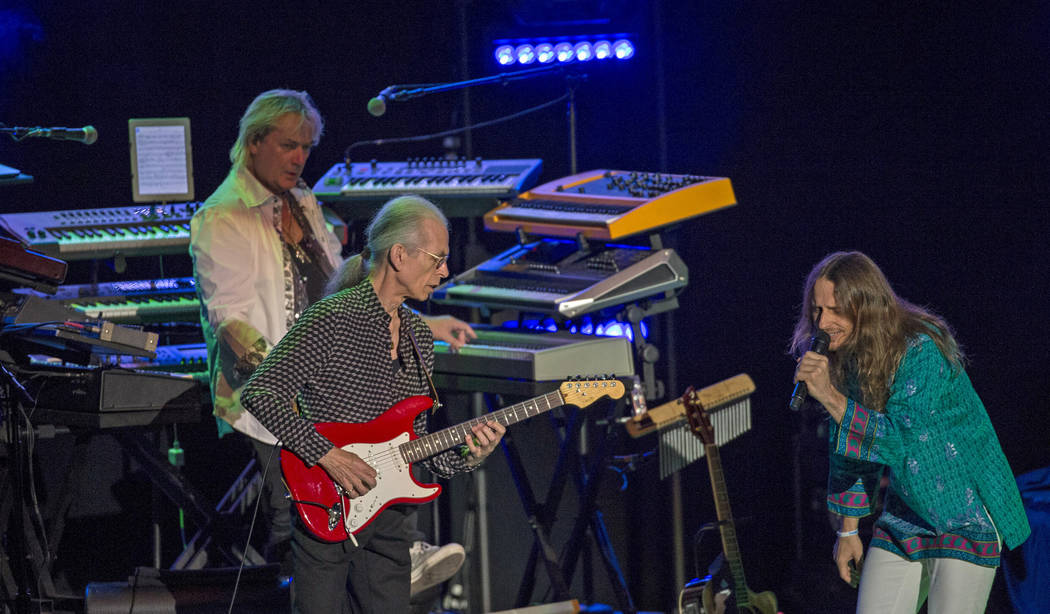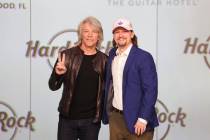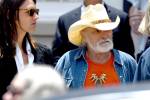2 incarnations of prog-rock favorites Yes visiting Las Vegas
OK, we get it, prog rock is the Napoleon Dynamite of music: It’s so easy to make fun of, it’s like the punch lines are lobbed underhand.
From two feet away.
And if you still can’t make contact, your dad will come out and helpfully place one on a tee for you, instructing you to keep your eye on the joke.
Afterward, you’ll eat orange slices.
Even The Atlantic got in on the action recently with a lazy, albeit well-circulated takedown of prog that was about as sharp and edgy as a Nerf ice pick.
But here’s the thing, you can goof on all those prog-rock conceits — intricate, self-involved songs full of musical peacockery and elaborate concepts that can easily create the suffocating sensation of being waterboarded in pretentiousness — but then there’s Yes.
And these dudes are in the Rock and Roll Hall of Fame for a reason, even if it took a minute for them to get in there.
As much as any band of their day, Yes bridged the yawning gap between the progressive and the populist, crafting dense, yet digestible albums that both musos and mainstream rock fans could dig.
It all remains an enviable feat, decades after the fact.
But here’s where the story gets interesting.
There are two bands with current and former members of the group out on the road, playing the Yes catalog in a less-than-friendly musical rivalry.
And they’re both hitting Vegas within days of each other.
There’s Yes, which headlines the Yestival with Todd Rundgren and Carl Palmer’s ELP Legacy at the Hard Rock Hotel on Saturday, and then there’s Yes featuring Jon Anderson, Trevor Rabin, Rick Wakeman, which hits The Smith Center for the Performing Arts on Thursday.
Let’s see how the two compare, shall we?
The split
What does Jon Anderson have in common with a former NFL quarterback whose bones are so brittle it’s as if they were sculpted from Triscuits, who spent more time on injury reports than Sisyphus did shoving rocks and cursing inclines?
Why, let us explain.
Nine years ago, Anderson totally got Dak Prescott’d.
In the same way the current Cowboys QB landed his gig after starter Tony Romo suffered the umpteenth fractured bone of his career, Anderson lost his job in 2008 when he was unceremoniously replaced while sidelined with acute respiratory failure.
According to Anderson, the band didn’t even notify him directly of the decision to move on with a different frontman.
On an irritability scale of 1 to 10, 1 being your significant other guzzling the last beer in the fridge, 10 being the guilty party replacing said brew with an O’Douls, we’d rate Anderson’s ire a solid 7½.
Legacy
Granted, prog is like one of those sweet ninja throwing stars in an infant’s hands, so much can go so wrong, so quickly — which only underscores the skill of a band like Yes to pull it off so convincingly.
So, how do these two groups compare in terms of the roles their members played in establishing the Yes legacy?
Well, the Yes lineup features guitarist Steve Howe, who’s been in the band since 1970. He co-wrote many of the band’s most beloved tunes and is roundly credited with steering Yes in a more commercial bent. Drummer Alan White entered the fold in ’72 and keyboardist Geoff Downes joined in ’80, while bassist Billy Sherwood has worked with Yes in numerous musical guises since the early ’90s. Finally, there’s singer Jon Davison, who began fronting the band in 2012.
As for the other unit, it boasts the original voice of the band in Anderson, who co-founded the group in ’68 and co-wrote plenty of fan favorites along with Howe. Keyboardist Rick Wakeman did five stints in Yes since first hooking up with them in ’71. He also has the strongest cape game when playing live. Guitarist Trevor Rabin joined Yes in ’83 and was instrumental in the group’s biggest-selling album, 1983’s “90125.” The band’s touring lineup is rounded out by bassist Lee Pomeroy and drummer Lou Molino III.
If Rock and Roll Hall of Famers are your measuring stick, the latter lineup takes it 3-2.
Set lists
Spoiler alert: If you don’t like to know what a band is going to play prior to seeing them live, go start stenciling the Yes logo on your homemade fan-dana, pronto.
OK, so here we go: Both groups close their shows with Yes’ signature “Roundabout,” and each outfit also plays the tasty, four-part prog-pastry roll “And You and I.”
And that’s where the similarities end.
Yes sticks mostly to the vintage jams, those chestnuts that the band originally played while still clad in bell-bottoms, not performing any selections after 1980’s “Drama” album.
As is to be expected with the Anderson-led unit, the set list reflects Rabin’s entrance into the group and includes a trio of tunes from “90125,” including their biggest hit, “Owner of a Lonely Heart,” as well as a song each from “Big Generator” (“Rhythm of Love”) and “Union” (“Lift Me Up”). Wakeman and Co. dig into plenty of classics, though, including five songs combined from “The Yes Album” and “Fragile.” They also delve into the epic “Awaken,” a 15-minute opus high on the list of the band’s most revered jams.
Basically, you could see both shows with little overlap, song-wise.
All this being said, knowing how die-hard you prog loyalists are, aren’t most of you just going to see both?
Yes.
And Yes.
Contact Jason Bracelin at jbracelin@reviewjournal.com or 702-383-0476. Follow @JasonBracelin on Twitter.































